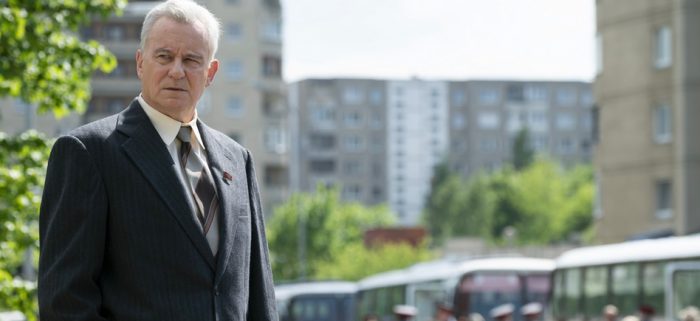'Chernobyl' Review: HBO's Captivating Miniseries Is Intense And Infuriating
Creator Craig Mazin and director Johan Renck hold a magnifying glass up to one of the worst nuclear disasters in history with Chernobyl. Most adults are aware of the disaster, and likely know the basics. But Chernobyl digs beneath the radiated earth, pulling up alarming truths that often come across as depressingly timely.
Because Chernobyl isn't just about a disaster on a technical level. It's about how the stubbornness and willful ignorance of humanity can bring about terrifying results. The end result is not easy to watch – but it is a must-see.
"Every lie we tell incurs a debt to the truth. Sooner or later, that debt is paid." So says Soviet nuclear physicist Valery Legasov (Jared Harris) during a trial surrounding the Chernobyl disaster. Yes, human error played a huge part in the massive explosion that ultimately released radioactive material into the air across Russia, and beyond. But there was another factor at play: the Soviet government's stubborn refusal to admit their shortcomings. Chernobyl, and other nuclear nuclear power plants in the Soviet Union, were unsafe at the time – but to admit so would be admitting that the Soviet Union had failed in some way. And that simply wasn't allowed.
So, as with most things in the Soviet Union at the time, a wall of deceit and lies was constructed, to the point where no one could truly tell where the lie ended and the truth began.
Why tell this story now? HBO's Chernobyl never goes so far as to compare itself to current events, but it's hard not to see the parallels. We find ourselves in strange times, where willful ignorance seems to be prevailing, and science is seen as something partisan. Over the course of five episodes, Chernobyl is issuing a warning: here is what happens when you embrace the lie, and avoid the truth that's staring you right in the face.
Chernobyl establishes its bleak mood immediately, opening with Legasov recording the last of a series of taped confessions in which he reveals what really happened during, and after, the Chernobyl disaster. These opening scenes are bathed in shadows, with director Renck creating an atmosphere of almost impenetrable darkness. After finishing his tapes and storing them away in a safe place, Legasov smokes one last cigarette, and hangs himself. The mood of the miniseries does not get any lighter from here.
The series then jumps back to mere seconds after the explosion at Chernobyl, where chaos, confusion, and infuriatingly deliberate ignorance sets in. There's clearly a major problem unfolding, but those in charge flat-out refuse to admit so. How could there be a problem? There are no problems in the Soviet Union.
Things go from bad to worse very quickly as the fire at Chernobyl rages on, with more hazardous things to come. In an effort to get things under control, the Kremlin assigns Soviet Deputy Prime Minister Boris Shcherbina (Stellan Skarsgård) to head a commission looking into the disaster. Shcherbina recruits Legasov to be part of the team, and makes it abundantly clear that Legasov is only supposed to observe, and keep his mouth shut.
But Legasov can't do that. He recognizes the enormity of the disaster almost immediately, and while he and Shcherbina clash at first, the Deputy Prime Minister slowly comes around to realizing that the nuclear physicist knows what he's talking about, and things are a lot worse than the Kremlin might be willing to admit.
The duo soon have another supporter in their midst: Ulana Khomyuk (Emily Watson), another nuclear physicist who catches on to certain things even faster than Legasov. As Chernobyl unfolds, these three characters struggle with trying to find ways to contain and minimize the fallout of the disaster, while also attempting to learn how it all happened in the first place.
Harris, a marvelous actor who seems to specialize in playing doomed characters, carries almost all the weight of the miniseries on his shoulders. But he's matched by Watson and Skarsgård. Watson's character is no-nonsense to the extreme, and often gets delegated to exposition duty. But the actress knows just how to make all of this work, delivering a grounded, honest performance in the process. Skarsgård is fantastic as the party man who slowly comes around to doing the right thing. His arc, as he goes from hard-nosed bureaucrat to heartbroken truth-teller, is a true highlight.
Chernobyl also takes time to check in with other individuals directly effected by the event. Jessie Buckley plays the wife of a firefighter who fails to understand the enormity of the situation, even as her contaminated husband quickly withers away before her eyes. Barry Keoghan is a young man recruited into military service to perform a rather ghoulish, soul-crushing task. And then there are the members of the Soviet government, including the KGB, all attempting to subvert the truth in some potentially detrimental way.
It all makes for an almost unbearably intense saga. One episode after another ratchets up the tension, reaching horror-movie levels of terror and anxiety. There's the occasional bright spot through some dry humor – Harris and Skarsgård play off each other beautifully, and their banter results in genuine laughs. But for the most part, Chernobyl is dour to the extreme.
That's not to say it's a slog. Far from it – it's remarkably thrilling and compelling, constructed with a kind o ticking-clock narrative that will have you on the edge of your seat. Just be warned: you won't come away from this series feeling particularly cheerful. But that's the point. Chernobyl doesn't want to sugarcoat the trauma. It wants to underline it, as a kind of warning. A message sent out from the past to the present: here is what happens when we ignore the truth.
Chernobyl debuts on HBO May 6.

